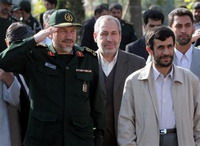Revolutionary Guards gain more influence in economy and government of Iran
They own car factories and construction firms, operate newspaper groups and oil fields and increasingly, serve in parliament or become provincial governors. They are the Revolutionary Guards.

To the United States, they are simply terrorists.
Either way, the group formed to safeguard Iran's 1979 Islamic revolution has pushed well beyond its military roots: Current and former members now hold a growing role across the country's government and economy, sometimes openly and other times in shadow.
The election of a hard-line president two years ago sharply accelerated that influence, recent interviews here suggest. Supporters of supreme leader Ali Khamenei and his protege, President Mahmoud Ahmadinejad, have sought to consolidate power by putting allies in key positions, potentially shaping Iran for years to come.
"We don't support it," Mohsen Mirdamadi, who leads Iran's largest pro-reform party, said of the guards' spreading influence. "It can be reversed with a change of government - but slowly."
Publicly, the guards now own or control numerous companies that receive lucrative, often no-bid government contracts in the oil and gas industry, farming, and road and dam construction. Their winning of deals is often announced outright in Tehran newspapers.
Other times, the group's business deals are shrouded in mystery and merely whispered about.
In one example, the guards are thought to run a network of unauthorized docks and trading firms importing consumer goods, tariff-free, into Iran, said Mehdi Khalaji, a researcher at the Washington Institute for Near East Policy.
That would be a lucrative business in Iran, where Western goods are harder to obtain.
In addition, an Iranian company that manufactures Japanese cars inside Iran is also thought to be owned by the guards, said Khalaji.
The guards have gained a particularly big role in the country's oil and gas industry in recent years, as the national oil company has signed several contracts with a guards-operated construction company. Some have been announced publicly, including a $2 billion deal in 2006 to develop part of the important Pars gas field.
Often, firms owned by Revolutionary Guards will get noncompetitive bids for major oil or construction projects and then outsource the project to others, operating essentially as a "private mafia," said Karim Sadjadpour, an Iranian-American who works at the Carnegie Endowment for International Peace in Washington.
Ray Takeyh, an Iran expert at the Council on Foreign Relations in New York, said the guards also have gained lucrative telecommunications contracts, and have known links with university labs, weapons makers and firms linked to Iran's nuclear program. All are industries with clear dual-use - civilian and military - potential, giving the guards firm links to many vital military-related industries.
The business deals also make the guards less reliant on Iran's more democratic and transparent institutions, such as parliament, for their funding. The no-bid government contracts often lack any independent oversight such as from parliament's budget process, meaning money from them can be diverted into overseas operations with little notice, other analysts said.
At least 80 former guards also are in parliament out of a total of 290 seats. Others serve as mayors and provincial governors. Former commanders also make up about two-thirds of the current Cabinet, according to some estimates, and Ahmadinejad himself is a former guards commander who went on to Tehran's mayor before being elected president.
That influence is a far cry from the group's original roots: It was founded in 1979 in the revolution's wake to provide a counterbalance to the U.S.-trained military at a time when Iran's new Islamic leaders feared the army might remain loyal to the deposed shah.
The Revolutionary Guards won widespread admiration and even public reverence in the 1980s when they defended Iran from Saddam Hussein's regime during the long, devastating Iran-Iraq war.
Now numbering about 125,000 members, they report directly to the supreme leader and officially handle internal security. The small Quds Force wing is thought to operate overseas, having helped to create the militant Hezbollah group in 1982 in Lebanon and to arm Bosnian Muslims during the Balkan wars.
The Bush administration accuses the Quds Force of sending fighters and deadly roadside bombs, mortars and rockets to kill American troops in Iraq in recent years - allegations that Iran denies.
The United States pressures U.S. and European banks to do no business with Iranian banks, such as Bank Sedarat that the Bush administration believes help finance guards' business operations. But the United States is also considering naming the entire group as a foreign terrorist organization, presumably allowing wider financial crackdowns.
Hard-liners within Iran generally both downplay and defend the guards' role.
Hossein Shariatmadari, a former guard member himself who is close to Khamenei, now runs the large Kayhan group of newspapers and magazines in Tehran. He said the prominence of former guards in business and politics is understandable because they often have the engineering training and management skills to run many industries. The group's primary focus remains safeguarding the country from outside threats, especially from the West, he said.
Even some outsiders wonder how much a terrorist designation would really do. Takeyh called the guards' business enterprises "murky and ambiguous" and said it would thus be difficult to target them precisely.
In addition, not all former guards are hard-liners. Many members of the country's reform movement and democratic opposition are also former guards, Takeyh noted, "making a terrorist label even more problematic."
Subscribe to Pravda.Ru Telegram channel, Facebook, RSS!


